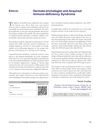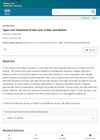 20 citations,
July 2009 in “Journal of Pediatric and Adolescent Gynecology”
20 citations,
July 2009 in “Journal of Pediatric and Adolescent Gynecology” Quick treatment of hair disorders in teenage girls is important because of the emotional effects.
 14 citations,
January 2013 in “International Journal of Trichology”
14 citations,
January 2013 in “International Journal of Trichology” Treating hair loss requires a comprehensive approach that addresses both physical and emotional aspects, with a focus on diagnosis, patient education, and good communication.
 9 citations,
January 2022 in “Dermatology”
9 citations,
January 2022 in “Dermatology” People with certain skin diseases often have more trouble understanding and describing their emotions, which can affect their health and treatment results.
3 citations,
November 2021 in “Stress” Girls had higher stress hormone levels during school due to social and emotional issues, while boys had higher overall hormone levels with slight changes when school started.

The case showed the need for quick investigation of virilization in women and how emotional health is linked to physical health.
 January 2019 in “ARC journal of pharmaceutical sciences”
January 2019 in “ARC journal of pharmaceutical sciences” Acne can be managed with various treatments and requires psychological support due to its emotional impact.
 January 2014 in “International Journal of Trichology”
January 2014 in “International Journal of Trichology” Hair changes are common in AIDS patients and can add to their financial and emotional stress.
December 2021 in “Journal of Cosmetic Dermatology” Thiol/disulfide balance is normal in male AGA patients but shifts towards oxidative stress with emotional stress and low vitamin D.
August 2017 in “DOAJ (DOAJ: Directory of Open Access Journals)” Hair loss significantly affects quality of life, causing emotional and social challenges.
158 citations,
March 2011 in “Journal of the American Academy of Dermatology” Patients with cutaneous lupus erythematosus have a severely impaired quality of life, especially emotionally.
 128 citations,
February 2016 in “British Journal of Dermatology”
128 citations,
February 2016 in “British Journal of Dermatology” Alopecia areata significantly lowers the quality of life, especially in emotional and mental health aspects.
 61 citations,
April 2014 in “The Journal of Steroid Biochemistry and Molecular Biology”
61 citations,
April 2014 in “The Journal of Steroid Biochemistry and Molecular Biology” Finasteride affects brain and blood steroids, causing lasting sexual and emotional side effects.
 9 citations,
February 2016 in “Cambridge University Press eBooks”
9 citations,
February 2016 in “Cambridge University Press eBooks” The conclusion is that self-concept, shame, and emotion regulation are key factors in hoarding disorder, body dysmorphic disorder, and trichotillomania, and should be targeted in treatment and research.
 6 citations,
October 1993 in “The journal of the Royal Society of Health”
6 citations,
October 1993 in “The journal of the Royal Society of Health” Children's hair loss has many causes and requires careful diagnosis and personalized treatment, including emotional support.
 1 citations,
September 2022 in “JAAD international”
1 citations,
September 2022 in “JAAD international” Patients generally feel positive about alopecia areata treatments, but emotions vary by treatment type.

The document concludes that hair loss in women is complex, often linked to aging, health conditions, and nutritional deficiencies, and emotional impacts should not be underestimated.
 January 2010 in “Springer eBooks”
January 2010 in “Springer eBooks” Hirsutism can lower a woman's quality of life, causing emotional distress and affecting social and work opportunities.
 January 2007 in “Elsevier eBooks”
January 2007 in “Elsevier eBooks” Alopecia areata is a reversible, autoimmune-related hair loss that can have significant emotional impact and uncertain treatment effectiveness.
 29 citations,
February 2017 in “International Journal of Women's Dermatology”
29 citations,
February 2017 in “International Journal of Women's Dermatology” Women with excessive male-pattern hair growth should get a full hormone check-up to find and treat any underlying issues, considering both medical and emotional aspects.
 17 citations,
November 2012 in “Maturitas”
17 citations,
November 2012 in “Maturitas” The conclusion is that proper evaluation and treatment of hair loss in midlife women is important, considering the emotional impact and potential for various treatments.
 17 citations,
October 2012 in “Dermatologic clinics”
17 citations,
October 2012 in “Dermatologic clinics” Treating excessive hair in women requires a holistic approach, including medical, aesthetic, and emotional support.
 6 citations,
May 1993 in “Archives of Disease in Childhood”
6 citations,
May 1993 in “Archives of Disease in Childhood” Children's hair loss can be caused by many factors, including autoimmune diseases, emotional stress, genetics, and infections, with treatment and prognosis varying.
 4 citations,
October 2018
4 citations,
October 2018 Hair loss in children is often caused by scalp infections, immune disorders, hair pulling, stress, and requires careful treatment due to emotional effects.
 3 citations,
October 2020 in “Plastic and Aesthetic Nursing”
3 citations,
October 2020 in “Plastic and Aesthetic Nursing” The document concludes that available medical treatments for common hair loss disorders are generally safe and effective, and the emotional impact of hair loss should be considered in treatment plans.
 2 citations,
June 2022 in “International Journal of Biomedicine”
2 citations,
June 2022 in “International Journal of Biomedicine” The review suggests a comprehensive approach to treat hirsutism, focusing on hair removal, medication, and managing emotional effects.
 2 citations,
December 2007 in “Expert Review of Dermatology”
2 citations,
December 2007 in “Expert Review of Dermatology” The document concludes that early diagnosis and treatment are key for pediatric hair loss disorders, and addressing the emotional effects on children is important.
 1 citations,
January 2015 in “Springer eBooks”
1 citations,
January 2015 in “Springer eBooks” AGA is a common hair loss disorder, and early diagnosis and treatment with minoxidil or finasteride can help reduce emotional distress.
 1 citations,
August 2004 in “Alternative & complementary therapies”
1 citations,
August 2004 in “Alternative & complementary therapies” Non-drug methods like diet, supplements, and aromatherapy can help manage hair loss and its emotional impact.
 January 2025 in “Tropical Medicine and Health”
January 2025 in “Tropical Medicine and Health” Most children in orphanages in Fayoum and Giza have skin disorders, mainly noninfectious, and need better hygiene and emotional care.
 December 2024 in “Journal of Clinical Medicine of Kazakhstan”
December 2024 in “Journal of Clinical Medicine of Kazakhstan” Vitiligo treatments include JAK inhibitors, UVB phototherapy, and dietary changes, with emotional support being important.


























